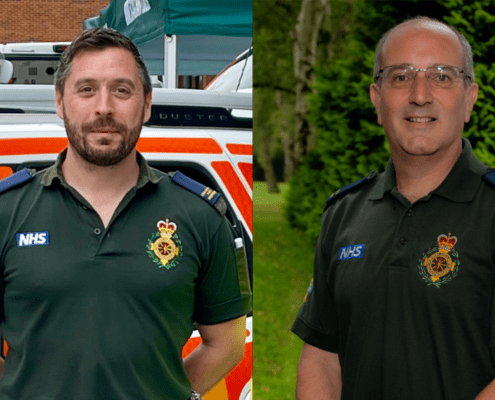Celebrations and Top Tips for National Apprenticeships Week
This week we’ve teamed up with Jess Greenfield, Apprentice AAP Mentor with South Central Ambulance Service (SCAS), for the lowdown on how apprenticeships work with the Trust, and how to ace your End-Point-Assessment!
How many apprentices do you current have at SCAS and how does having apprenticeships benefit your workforce?
We currently have four active cohorts of apprentice Associate Ambulance Practitioners (AAP’s) within SCAS, giving us 48 active apprentices at the moment.
The real benefit of an apprenticeship to us as a Trust is that it enables us to increase our operational workforce whilst still providing learning and development on placement – this is equally beneficial to the learner gaining valuable experience and clinical skills whilst also earning a wage at the same time as learning. We have found as a Trust our clinical staff value having apprentices to work with, giving them opportunities to share their knowledge and skills whilst performing their operational duties.
What is it like working with FutureQuals?
We have found working with FutureQuals to be enormously valuable! We have been able to link and coordinate with members of the team ensuring we have the most accurate and up to date information regarding apprenticeships. This ensures we can educate and prepare our learners for what is expected of them during their assessments. FutureQuals have actively sought our feedback and acted upon it, driving change where it was required and empowering us as an organisation that our feedback is vital to the success of the programme.
The EPA is the assessment at the end of the apprenticeship which every learner needs to go through. How do you prepare your apprentices for this?
At SCAS we try and help prepare apprentices as much as possible for their End-point Assessment to help alleviate any fears or worries. We bring our learners back to Education for two ‘mock’ days where we run practice exam questions and simulation examinations. We have experienced Educators on hand to answer any questions they might have about the assessment or to run through any practical elements they may want a refresher on.
Can you share some top tips for apprentices to prepare for their EPA?
My top tips for apprentices preparing for their End Point Assessments would be firstly – don’t panic! The assessors are approachable and friendly, and have experience with pre-hospital care so are familiar with any acronyms or jargons so you don’t need to over-explain yourself.
Secondly I encourage learners to approach each scenario-based examination as if it were a real patient – talking to the manikin as you would a patient can help you remember those all important assessment skills that come naturally to you in ‘real life’, enabling you to perform better and showcase your knowledge in the assessment.
Lastly, and similarly with any examination, I would recommend to learners to look after their own mental well being before and after the examination. We all know exams can be stressful, so do ensure you get plenty of rest the day before; eat a well balanced meal; and plan for something stress-relieving after the day, whether that’s going for a walk, or playing a game, whatever you would normally do to relax or unwind.
So there’s lots to celebrate about, not be scared about, with the EPA?
Yes! The End Point Assessment is a fantastic opportunity for learners to showcase their knowledge and abilities. As a Trust we are extremely proud of all our apprentices and their achievements and know they represent us brilliantly every day when they are working with patients. So we want to enable them to demonstrate this high standard to the assessor from FutureQuals during their EPA.





